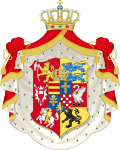Family and life
Christian was born in Rastede, Lower Saxony, the only son of Duke Anton-Günther of Oldenburg and his wife Princess Ameli of Löwenstein-Wertheim-Freudenberg (b. 1923). Christian has an elder sister, Duchess Helene (b. 1953) who is unmarried. Christian has a diploma in Business. [1]
Christian is a great-grandson of the last Grand Duke of Oldenburg to reign, Frederick Augustus II and through his mother he is related to the Princes of Löwenstein-Wertheim-Freudenberg, who belong to a morganatic branch of the House of Wittelsbach descending from Frederick I, Elector Palatine.
Christian became heir to the headship of the Grand Ducal family on 3 April 1970 when his grandfather Hereditary Grand Duke Nikolaus died. According to his father's obituary issued by the family his ancestral titles (however not all part of his official German surname) are: HRH The Duke of Oldenburg, Heir in Norway, Duke of Schleswig, Holstein, Stormarn, Dithmarschen and Oldenburg, Prince of Lübeck and Birkenfeld, Lord of Jever and Knyphausen .
The ancestral home of the House of Oldenburg is Oldenburg castle, nowadays a museum owned by the state. Present seats of the Duke of Oldenburg are Rastede Palace near Oldenburg and Güldenstein Manor, Harmsdorf, in Schleswig-Holstein. Eutin Castle in Schleswig-Holstein is a museum owned by a family foundation set up by his father.
- Güldenstein Manor, Harmsdorf




